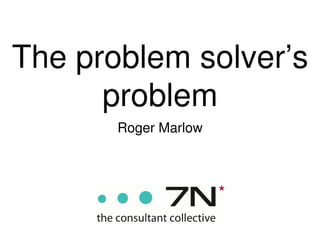The problem solvers problem
- 1. The problem solverŌĆÖs problem Roger Marlow
- 2. You choose Pairs of problems Which would you prefer to solve?
- 3. et past the compiler Pacify
- 4. Tune Educate
- 5. Find shortest Entertain circuit
- 6. Quote Reconcile
- 7. Factorise Explain why his system is d
- 8. Problems, problems. In the software community we think of ourselves, even define ourselves, as problem solvers But only for certain types of problem
- 9. People problems? We dismiss people problems: ŌĆ£politicsŌĆØ ŌĆ£personality clashŌĆØ ŌĆ£managementŌĆØ Identify it. Dismiss it.
- 10. So what? People... Commission, Design, Plan, Build, Install, Operate, Fix, Support, Choose, Buy, Sell, Use, Manage and Pay For ...Software. But apart from that, they are irrelevant to it.
- 11. The right tools for the job Technology People Ō£ōAbstraction Ō£ōSimplification Ō£ōLogic Ō£ōIntuition Ō£ōDecompositio Ō£ōHolism n
- 12. The trouble is... Our preference for Over these these tools Ō£ōAbstractio n Ō£ō Simplification Ō£ō Intuition Ō£ōLogic Ō£ō Holism Ō£ōDecompŌĆÖ
- 13. For example w does this work? wo parrots are sitting on a perch. One says to the other ŌĆ£Can you smell fish?ŌĆØ straction Holis gic Intuiti
- 14. Reductionism (itŌĆÖs a problem) I.T. suffers from reductionism We have all seen the damage this does to I.T. departments ŌĆó Analyse, categorise, group, standardise, commodatise ŌĆó Leads to siloed roles, hand-offs, lack of feedback, process over people, contracts over collaboration, etc. So why are we doing it to Agile?
- 15. WeŌĆÖre forgetting what made Agile work Keep the big picture in mind Iteration, not incrementalism Whole team. Collective code ownership Organise for the most important thing - people on the proje Simplification rather than decomposition It is taking us in the wrong direction
- 16. For example: stories De-humanised Human friendly
- 17. Another example: iterations De-humanised Human friendly Only ever a few days from much work to comprehend finished ationŌĆÖ ends ignored Manageable work load dom feel done Genuine want to ŌĆśgo for itŌĆÖ at
- 18. Other examples Reductionist, de- Simple, Intuitive, humanised Holistic r more elaborate estimation niques Experience based estimati arisome stand-ups Human friendly office behaviour i-week ŌĆ£refactoringsŌĆØ to ch to an uber-design Refactoring: tidy-up as you plethora of tooling Simple tools, e.g. cards
- 19. Glimmers of hope? oQ mailer: July 27th ŌĆó Social data as graphs of objects ŌĆó Database migration at Netflix ŌĆó Craft and engineering in the development process ŌĆó Type checking in dynamic languages ŌĆó New book: Individuals and interactions: An Agile Guide ŌĆó Comparison of automation tooling ŌĆó Example of Oozie workflow server ŌĆó Tools for reverse engineering in .NET and Java
- 20. Glimmers of hope? ew book: Individuals and interactions: An Agile uide The authors present a set of tools and techniques...ŌĆØ The book places a lot of emphasis on knowing yourself, and understanding how nteract with others.ŌĆØ It presents the DISC framework for self- and team-discoveryŌĆØ How does the DISC framework compare to other psychometric tools, such as Myers-Briggs Type Indicator? If someone knows their MBTI profile how does it m o the DISC framework you present?ŌĆØ Our experience is that the majority of the really difficult problems that projects (a even companies) face are not technology related but rather associated in some w o problems with team dynamics, organizational behavior or communication issue DISC is not the end all-be-all. But it is one component in helping team members along, understand one another, and modify communication styles to maximize
- 21. We have seen this before Reductionism made Waterfall ludicrous The tendencies are still there Agile started with a clean slate, but itŌĆÖs starting to look messy ItŌĆÖs not the methodology - ItŌĆÖs us
- 22. And my point is? Agile was successful because it was people friendly, and people are critical to software development. It gave those of us who are not naturally good at ŌĆśpeople friendlyŌĆÖ stuff, a people friendly process. Agile wonŌĆÖt progress unless we remember this It needs to progress because it does not always work Emphasis on tools is misplaced. It is of secondary importance People are of primary importance. They make the differenc





















